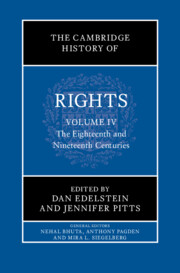Book contents
- the cambridge history of rights
- The Cambridge History of Rights
- The Cambridge History of Rights
- Copyright page
- Contents
- Figures
- Contributors to Volume IV
- General Introduction
- A Note on Translations
- Introduction to Volume IV
- Part I A Revolution in Rights?
- Part II Postrevolutionary Rights
- 12 On the Nadir of Natural Rights Theory in Nineteenth-Century Britain
- 13 The 1789 Declaration of the Rights of Man and of the Citizen
- 14 Rights in the Thought of Kant, Fichte, and Hegel
- 15 Rights and Socialism 1750–1880
- 16 Economic Liberalism and Rights in the Nineteenth Century
- 17 Human Rights during the 1848 Revolutions
- Part III Rights and Empires
- Index
- References
14 - Rights in the Thought of Kant, Fichte, and Hegel
from Part II - Postrevolutionary Rights
Published online by Cambridge University Press: 22 January 2025
- the cambridge history of rights
- The Cambridge History of Rights
- The Cambridge History of Rights
- Copyright page
- Contents
- Figures
- Contributors to Volume IV
- General Introduction
- A Note on Translations
- Introduction to Volume IV
- Part I A Revolution in Rights?
- Part II Postrevolutionary Rights
- 12 On the Nadir of Natural Rights Theory in Nineteenth-Century Britain
- 13 The 1789 Declaration of the Rights of Man and of the Citizen
- 14 Rights in the Thought of Kant, Fichte, and Hegel
- 15 Rights and Socialism 1750–1880
- 16 Economic Liberalism and Rights in the Nineteenth Century
- 17 Human Rights during the 1848 Revolutions
- Part III Rights and Empires
- Index
- References
Summary
For Kant, Fichte, and Hegel, the significance of rights lay in the value of freedom. The distinctive feature of persons, their capacity to determine their own ends, grounded the obligation of other human beings to respect the conditions of free agency and thus to acknowledge one another as bearers of rights. All understood rights as universal and intersubjective: it follows that rights can only be fully realized in an appropriately constituted social state. For Kant, this meant that rights in the state of nature are merely provisional, and that to make rights claims is to commit oneself to the pursuit of a civil state, indeed to a civil state in federation with other such states, subject to principles of international law and cosmopolitan right. For Fichte, the intersubjective nature of rights was even more central to their meaning, for the guarantee of rights enables our self-understanding as free beings, with the capacity to cultivate our individuality and pursue a distinctive identity. Rights thus understood not only respect our personhood but actually constitute us as persons. Kant’s emphasis on external freedom, freedom from outside interference, led him to focus almost exclusively on property rights, while Fichte recognized far more expansive socioeconomic rights as security the material conditions of free agency. Finally, Hegel’s account, though deeply influenced by Kant and Fichte’s grounding of rights in the value of freedom, maintained that individual rights are insufficient for the realization of complete freedom, which must be realized in common. In so doing he partly anticipated Marx’s critique of the limitations of rights as fundamentally bourgeois property rights and thus as incapable of undergirding truly human emancipation.
- Type
- Chapter
- Information
- The Cambridge History of Rights , pp. 341 - 360Publisher: Cambridge University PressPrint publication year: 2024

